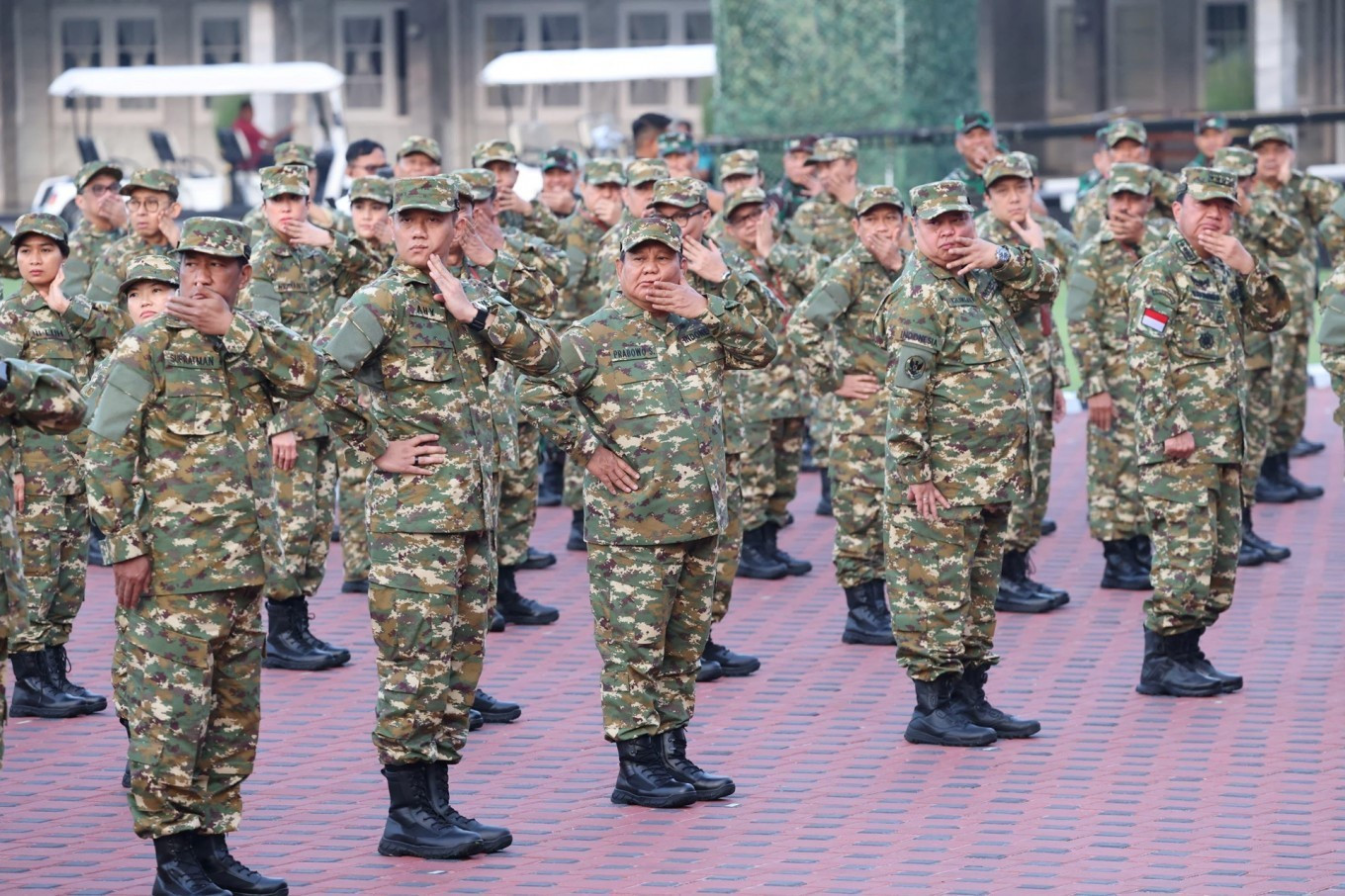News
Prabowo and the military: Indonesia’s renewed normal
Tenggara Strategics October 3, 2025 President Prabowo Subianto (front, third left) attends a warm-up session during the retreat with members of his Red and White Cabinet at the Military Academy in Magelang, Central Java, on Oct. 25, 2024. (Prabowo’s Media Team/Handout via Reuters)
President Prabowo Subianto (front, third left) attends a warm-up session during the retreat with members of his Red and White Cabinet at the Military Academy in Magelang, Central Java, on Oct. 25, 2024. (Prabowo’s Media Team/Handout via Reuters)
When President Prabowo Subianto deployed the Indonesian Military (TNI) to the streets to restore order during last month’s nationwide protests, it was merely the latest example of a pattern the country has witnessed since he took office in October last year.
As a former army general from the New Order regime, his allegiance to the uniformed security forces has long been a defining feature of his political career. Critics have voiced fears of creeping militarization, human rights violations, and a free fall toward authoritarianism. Nearly a year into his presidency, these critiques ring more true than hollow.
From the start, Prabowo has made it his mission to involve the TNI in every facet of his administration. His most trusted aide-de-camp is fellow army man Lt. Col. Teddy Indra Wijaya, who serves as his cabinet secretary. It is an open secret that anyone wishing to reach the President must first go through Teddy, who also served as Prabowo’s adjutant when he was the defense minister. Teddy’s tenure has drawn criticism for his lack of experience and his exaggerated military persona, acting more like the President’s personal bodyguard than a secretary.
Prabowo’s army friends have also been appointed to key sectors, especially those he deems vital to his mission. To monitor the progress of his flagship free nutritious meals program, he has entrusted the military with on-the-ground tasks of overseeing kitchens and distributing food directly to children. This vision for national food security is further solidified by the appointment of Maj. Gen. Ahmad Rizal Ramdhani as president director of the State Logistics Agency (Bulog), securing the military's grip on the entire supply chain.
Two of his longtime friends, including those who he led in the infamous Rose Team (Tim Mawar)—a group of Army’s Special Forces personnel responsible for the kidnapping and torture of democracy activists in 1997-1998—are also active in this administration. Sjafrie Sjamsoeddin, Prabowo’s classmate in the Military Academy, serves as defense minister and former Rose team member Djaka Budhi Utama as head of the customs office in the Finance Ministry. Both hold strategic positions in line with Prabowo’s view of realpolitik, national defense and the need for greater discipline in the flow of goods into and out of the country.
One of the administration’s many controversial actions was the revision of the Military Law this year, which expanded the number of civilian posts active-duty military officers can fill. This law was met with strong disapproval from students and activists who continue to demand that the military “return to the barracks" and stay away from civilian affairs.
This resistance is particularly challenging for Prabowo, as he is known to favor subordinates from a military education background. Aside from military men, Prabowo’s inner circle is shaped by graduates of Taruna Nusantara (Tarnus), a boarding school founded by the military. Teddy, Foreign Minister Sugiono, State Secretary Prasetyo Hadi, and Deputy Agriculture Minister Sudaryono all share this Tarnus alma mater.
Prabowo’s fascination with military boarding schools has also extended to his vision for national education. Through his Community School program, he aims to replicate the success of Tarnus nationwide. While the initiative's intention is good, its implementation has already had a rocky start. The program is currently run by the Social Affairs Ministry instead of the Education Ministry, prompting critiques over a glaring misalignment of institutional duties. At the same time, the Prabowo government has pledged over Rp 1.4 trillion (US$83.71 million) to create six more Tarnus schools under the supervision of the Defense Ministry, further diminishing the role of the Education Ministry.
After attaining the presidency, Prabowo has shifted from simply harboring his allies to consolidating power for himself, and with him, the military. His most recent cabinet reshuffle saw the 65-year-old coordinating political and security affairs minister, Budi Gunawan, replaced by 76-year-old Djamari Chaniago, Prabowo’s senior from his years in the army. Instead of a refreshing figure who could bridge the gap between Prabowo and reform-minded youth, Prabowo again looked to his past to move forward.
As his first year in office approaches, the military has become more relevant than at any point since the late 20th century, when his former father-in-law, Soeharto, led the country with an iron fist. Now, taking in his footsteps, Prabowo appears to have rejuvenated this military pride, leaving traces of camouflage and bootstraps for many more years to come.
What we've heard
A close associate of Prabowo said the President wanted to embrace those who discharged him from the military in 1998, including Djamari. Of the dozen officers on the ethics council to impose that decision, only Fachrul Razi has yet to be brought into the government. “Fachrul still stands in opposition to Prabowo,” said the source.

